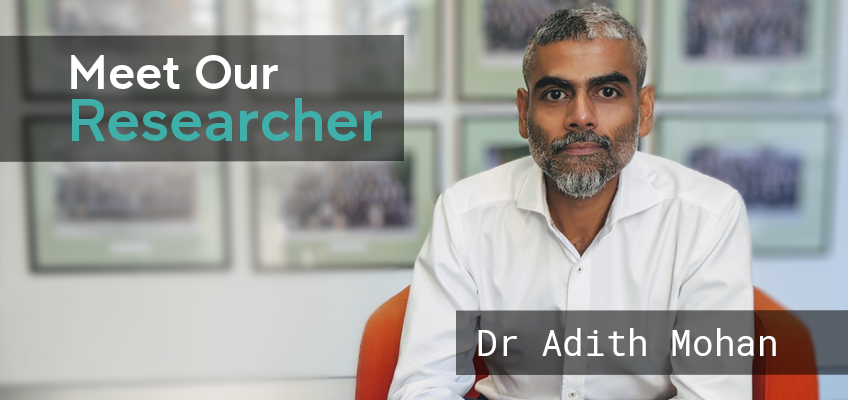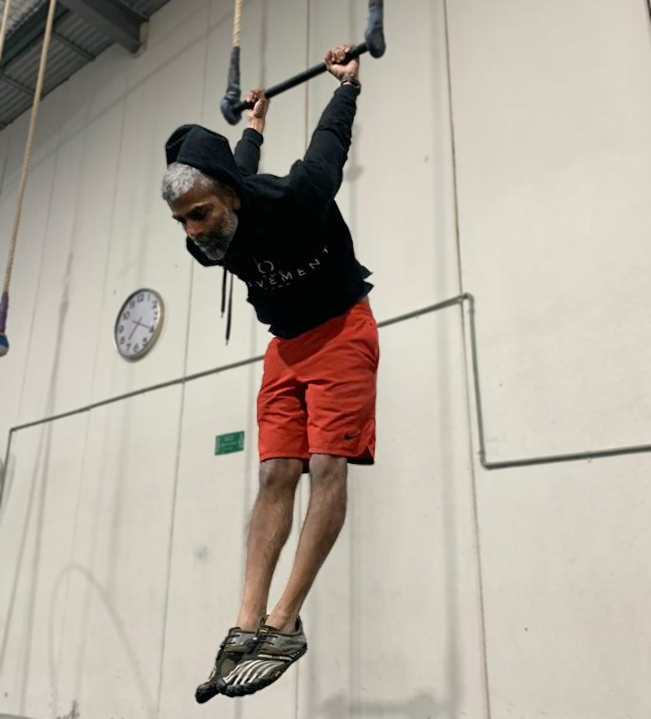20 Jul 2020

Dr Adith Mohan’s transition from clinician to clinician-researcher stems from his interest in applying the principles of neuroscience to his clinical practice as a neuropsychiatrist. He is currently investigating gene expression across the lifespan to try to add to our knowledge of the risk factors for developing age-related brain diseases. He believes that uncovering age-related brain vulnerability is critical to understanding and preventing degenerative disorders such as Alzheimer’s disease.
How did you get into researching the ageing brain?
I completed my medical training in 2002 followed by specialising in psychiatry and subsequently neuropsychiatry. Currently, I am a neuropsychiatrist based three days a week at the Prince of Wales Hospital where I work directly with my patients. My research career evolved from my clinical background and that of my chosen subspecialty, neuropsychiatry, where we pay attention to the principles of neuroscience and their application to brain disease. Within my clinical practice, paying attention to clinical neuroscience research and contemporary thinking in this space is essential. Consequently, my move into researching the ageing brain was a natural progression. Degenerative brain disorders are a significant portion of the disease spectrum I encounter, particularly in those affected by Alzheimer’s disease.
Seeing a range of degenerative brain disorders in the clinic spurred me to engage in the scientific process of asking questions with strong potential for translational impact.
As a clinician-researcher the questions I am most interested in are the ones that my patients would like to see answered. They are often ‘Why am I becoming unwell?’ or ‘What can you do to make me better?’ and with regard to the ageing brain, these are questions we are yet to answer.
Did you experience a ‘defining moment’ which led you to this field?
I have had the good fortune of a series of defining moments rather than any single one. My training has been over a period of nearly two decades and along the way I have been inspired by my patients and my desire to strive to do better for them. Also, I have had the pleasure of working and interacting with leaders in the field including CHeBA’s Co-Directors Professor Perminder Sachdev and Professor Henry Brodaty. It is always inspiring to see other clinician-neuroscientists such as Perminder and Henry who have committed themselves to answering the same questions that play on my mind as a scientist and a medic. The passion they have for their work makes you appreciate that engaging fully in the research process can be far reaching and have great impact.

Do you have any personal interests or activities which are protective behaviours against cognitive decline?
I am a third of my way through my PhD. Engaging in an activity that is as cognitively challenging as doing research in itself is quite protective against cognitive decline. I am quite physically active; training in gymnastics and Crossfit during the week. My personal life is busy in the extreme with my wife - a child psychiatrist - and I looking after our two young children and two dogs. We maintain a busy social agenda and are very connected with others which is also protective against cognitive decline. Since our children have become a little older we have got into puzzles and games, particularly during the period of COVID-19 isolation. Personally, I enjoy reading, listening to music and playing about with music products and audio equipment. I have been particularly engaged in this hobby over the last five years and have fallen in love with the world of sound and music. I have always loved listening to music, but now I think about it from the perspectives of music mastering and reproduction which is endlessly fascinating.
What are you currently researching?
I have research agendas that are driven by my clinical work as well as my role at CHeBA, both of which overlap to some degree. Most important to me right now is my PhD research which is a substantial body of work investigating the way that genes change their expression over the lifespan as the human brain ages. The purpose of doing so is to answer one of the most critical questions of all: “what are the risk factors for developing a degenerative brain disease like Alzheimer’s disease as we get older and what can we do to prevent this?” The simple fact is that ageing is inevitable. Why some people end up at higher risk of developing neurodegenerative diseases as they get older while others do not is therefore an important and fascinating question to examine. I am looking at that question from the point of view of gene expression. I do this by examining post-mortem brain tissue, donated by generous individuals to aid brain research across the world. This will give us valuable insight into normative ageing as it occurs in the human brain.
Why is your research important?
From a scientific point of view, we are looking at the foundations of ageing from the ground up. It is not just my own, but all of our collective research at CHeBA focused on ageing that will help delineate what makes us vulnerable to age related disease. It is a critical question to answer if we are to develop effective treatments and more importantly, preventative strategies. Identifying vulnerability to disease and prevention are approaches that have been hugely productive in cardiovascular disease for instance and is absolutely the approach we want to apply to brain disease and Alzheimer’s disease in particular. We want to address the factors that make people more susceptible to developing disease.
If we understand what goes wrong in the brain as we get older it might give us a clue as to what we need to do to prevent and treat Alzheimer’s disease. This research has important potential outcomes, with the potential for translation into clinics which gives me such hope and satisfaction as a practicing clinician.
What do you love about working for CHeBA?
I have been working with Perminder Sachdev and Henry Brodaty through UNSW’s Brain and Ageing Research Program before the Centre – “CHeBA” - was established in 2012 and have been a member of their team for nearly a decade. Along the way I have had the privilege of working alongside passionate scientists and motivated clinicians, all of whom are driven by the desire to see good outcomes for our patients and the ageing public. To see the continuing passion of our CHeBA Co-directors, who between them share nearly a century of work in the field, is undeniably inspiring! However, it is not just them but indeed everyone involved from administration, the communications team, and every scientist in-between, including research fellows, post-doctorate fellows and students. Everyone shares a common vision and to be part of a research centre with such a coherent agenda for what we want to achieve is invaluable. CHeBA is quite special in that way. People are happy to be supportive and there is very little scientific ego which is refreshing and makes you want to work there. It is very clear at CHeBA that the science and the research come first and there is a culture of mutual support aimed at achieving our shared goals which I think is important above all else.
What is the ultimate hope you have for your research?
My ultimate hope is aligned explicitly with CHeBA’s vision; to improve the quality of life of individuals throughout the lifespan. That good health is intrinsically linked with healthy cognition so that people are able to engage fully in socialising, their occupation, and indeed any other aspect of their life that makes it meaningful for them. We want that for ourselves, our patients, and others so we can all live the entirety of our lives to the fullest with our loved ones. In terms of my immediate research goals, I am hoping to gain important insights into the way neurotransmission and synaptic functioning work in the ageing brain through my gene expression study. As a group we are also looking at the way different RNA molecules and genes interact with each other as the brain ages. Additionally, how gene networks within the brain interact with each other and how they change over time. The purpose of doing this would be to think about how we might be able to target treatments and preventative strategies that have a positive impact on the ageing brain.
This interview was undertaken during the COVID-19 self-isolation period. Dr Adith Mohan found the additional time he has spent with his family has been a blessing in disguise and a rejuvenating force for his research and clinical work.
Donations are fundamental for critical research to continue following COVID-19.
If you would like to discuss supporting Dr Mohan’s work specifically, or would like information
on leaving a legacy via a Gift in your Will, please contact h.douglass@unsw.edu.au.

Dr Adith Mohan is a Research Fellow at CHeBA, Consultant Neuropsychiatrist at the Neuropsychiatric Institute at the Prince of Wales Hospital, and a Senior Lecturer within the School of Psychiatry at UNSW Sydney. He is actively involved in the Section of Neuropsychiatry of the Royal Australian and New Zealand College of Psychiatrists as the jurisdictional representative for New South Wales. Dr Mohan is currently completing his PhD at UNSW on human brain transcriptome changes related to ageing. His broader research interests include novel pharmacological interventions in neuropsychiatry, the neuropsychiatry of epilepsy, neurocognitive disorders and therapeutic neuromodulation in neuropsychiatric disorders. He and his family have enjoyed completing puzzles and playing board games during this period of social distancing; both being fun and cognitively stimulating activities and possibly brain protective, not to mention helping to keep his young kids occupied!
